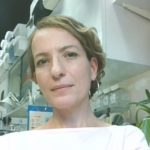Lien vers Pubmed [PMID] – 30936319
Lien DOI – 10.1073/pnas.1821844116
Proc. Natl. Acad. Sci. U.S.A. 2019 04; 116(16): 8010-8017
Noise overexposure causes oxidative stress, leading to auditory hair cell damage. Adaptive peroxisome proliferation involving pejvakin, a peroxisome-associated protein from the gasdermin family, has been shown to protect against this harmful oxidative stress. However, the role of pejvakin in peroxisome dynamics and homeostasis remains unclear. Here we show that sound overstimulation induces an early and rapid selective autophagic degradation of peroxisomes (pexophagy) in auditory hair cells from wild-type, but not pejvakin-deficient (Pjvk-/-), mice. Noise overexposure triggers recruitment of the autophagosome-associated protein MAP1LC3B (LC3B; microtubule-associated protein 1 light chain 3β) to peroxisomes in wild-type, but not Pjvk-/-, mice. We also show that pejvakin-LC3B binding involves an LC3-interacting region within the predicted chaperone domain of pejvakin. In transfected cells and in vivo transduced auditory hair cells, cysteine mutagenesis experiments demonstrated the requirement for both C328 and C343, the two cysteine residues closest to the C terminus of pejvakin, for reactive oxygen species-induced pejvakin-LC3B interaction and pexophagy. The viral transduction of auditory hair cells from Pjvk-/- mice in vivo with both Pjvk and Lc3b cDNAs completely restored sound-induced pexophagy, fully prevented the development of oxidative stress, and resulted in normal levels of peroxisome proliferation, whereas Pjvk cDNA alone yielded only a partial correction of the defects. Overall, our results demonstrate that pexophagy plays a key role in noise-induced peroxisome proliferation and identify defective pexophagy as a cause of noise-induced hearing loss. They suggest that pejvakin acts as a redox-activated pexophagy receptor/adaptor, thereby identifying a previously unknown function of gasdermin family proteins.

